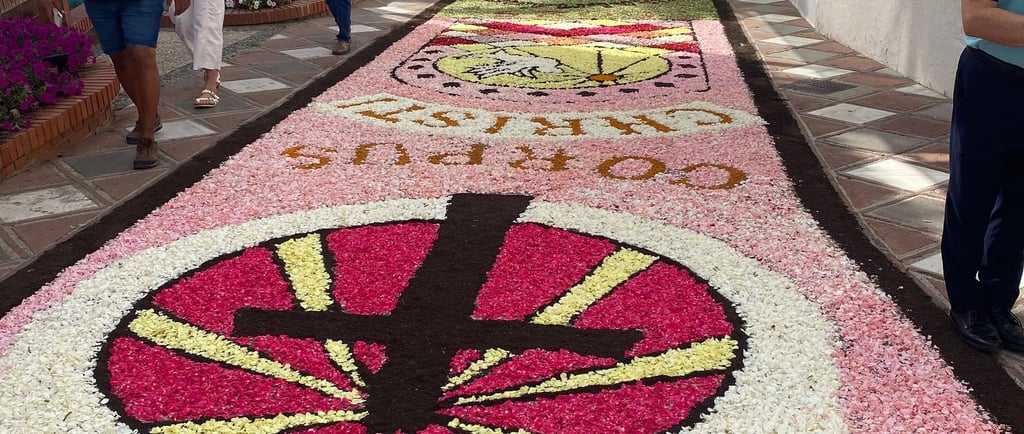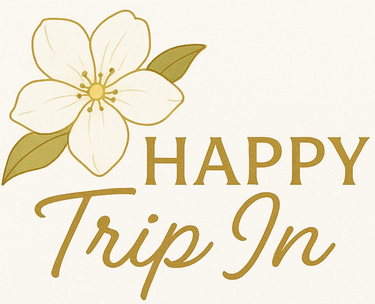Málaga, between sky and blood: the spellbinding beauty of Andalusian traditions
Beneath flower-filled balconies, between cobbled streets and white bell towers, the city of Málaga beats to the rhythm of an ancient heart. Here, tradition is not a frozen past: it's a flame that dances, music that pulses under the skin, a mystery that repeats itself every year with the same intensity as the first cry.
ESP
7/23/20255 min read


Andalusia is not just a landscape of silvery olive groves, flower-filled patios and sun-drenched towns. Above all, it is a state of mind, an art of living rooted in the hearts of its inhabitants: the Andalusians. Proud without arrogance, funny without flippancy, warm without condition, they make their land a place where strangers become friends, sometimes even brothers.
Hospitality born from the sun... and the land
In Andalusia, we often say: ‘Mi casa es tu casa’ - ‘my house is your house’. This is not a polite phrase, but a sincere attitude, an ancestral gesture handed down from generation to generation. Whether in a white village perched in the Sierra, a working-class district of Seville or a beach in Málaga, the welcome is spontaneous, generous and instinctive.
A living tradition: in many Andalusian villages, especially in rural areas, doors are not locked during the day. This is not negligence: it's a sign of trust, of community. Everyone knows their neighbour, and visitors are sacred.
A people forged by interbreeding and memory
Andalusia's identity was forged at the crossroads of many worlds. Phoenicians, Greeks, Romans, Visigoths, Arabs, Jews and Christians have all left their cultural, culinary, linguistic and musical mark. Andalusia was the crucible of a golden age, particularly under al-Andalus, when Cordoba rivalled Baghdad in terms of science, poetry and tolerance.
The Andalusian soul is born of this intermingling: proud, hospitable, deeply human, with an awareness of time that does not follow the clock, but the sun, the seasons, the harvests and the festivals.
Unusual but true: the word ‘olé’, often shouted during flamenco or bullfighting performances, is said to come from the Arabic ‘Allah’, a cry of fervour. It has remained, transformed, in the mouths of the Andalusian people, like a distant echo of the Muslim era.
The art of celebrating: parties, music and spontaneity
Andalusians have an innate sense of festivity. But it's not just about music and wine. It's a form of collective expression, a way of celebrating life in spite of everything, of sublimating pain, joy, love and expectation.
Flamenco: the naked soul of Andalusia
Born in the gypsy communities of Andalusia, flamenco is a cry from the heart. The palmas (clapping hands), cante jondo (deep singing) and fiery dance tell of exile, passion and revolt. To attend a real flamenco tablao, in a white cellar in Granada or a patio in Jerez, is to touch the very essence of this culture.
Popular festivals: from the sacred to the secular
Andalusian life is punctuated by a myriad of ferias, romerías and processions. Semana Santa, village ferias, the Romería del Rocío, or the cruces de mayo... Each time, the public space becomes a theatre, the intimate becomes collective, the street becomes a temple or a dance floor.
Local curiosity: at certain romerías (rural pilgrimages), Andalusians travel in caravans of decorated carts, dressed in traditional costume, singing religious coplas... while grilling chops and dancing the Sevillana alongside rosaries.
Today: living traditions in a modern world
Modern Andalusia is not rejecting its roots. On the contrary, it is reinventing them with creativity. In cities such as Seville, Malaga and Cadiz, young Andalusians are blending tradition with modernity: you can hear electronic flamenco, eat tapas with a twist, see poetic graffiti inspired by Lorca, and dance in trainers at the ferias.
But the human warmth has not changed. Just ask a Malagueño for directions and you'll be invited for a coffee. Or say ‘hello’ to an elder in a village and he'll talk to you for an hour, offering you figs and wine.
Easter Week: sacred theatre and Baroque passion
There is perhaps nothing more Andalusian - or more bewitching - than Málaga's Semana Santa. During this sacred week (Semana Santa), the entire city is transformed. The streets become cathedrals, the shadows become prayers, and the silences are filled with subdued tears.
The brotherhoods (cofradías), some of which are centuries old, bring out their ‘tronos’, huge gilded wooden floats shouldered by hundreds of men - the portadores - over routes that sometimes last more than 10 hours. Each trono represents a scene from the Passion: the Virgin in mourning, the bloodied Christ, or the lonely cross under the moon.
Unusual: The throne of the Virgen de la Esperanza in Málaga is one of the largest in Spain, weighing in at over 5,000 kilos. It takes 260 men to carry it. It doesn't always fit under electricity wires or balconies, so sometimes the bearers kneel down together to slowly slide the throne under the obstacles. A choreography of faith and endurance.
The ‘saetas’: soulful cries from the balcony
One of the most moving moments was the ‘saetas’, flamenco songs sung a cappella from a balcony in the middle of the procession. No music, no microphones. Just a naked voice, burning with pain, rising into the night. A mystical cry of love addressed to the Virgin Mary or Christ. The procession stops. Everyone falls silent. Time pauses.
It is said that certain improvised saetas still make old men weep, even those who no longer believe.
The cult of the Virgin: gentleness, tears and promises
In Málaga, the Virgin Mary is more than just a religious figure. She is the Mother, the Protector, the sublime Woman, both sorrowful and triumphant. Each district has its own patron saint, complete with embroidered garments, jewels and perfumes.
Unusual: In some churches, the faithful themselves dress the statue of the Virgin according to the season, with outfits that change like those of a living queen. She also receives gifts of hair, given by women as a sign of gratitude or mourning, which are sometimes used to create wigs for the statue itself.
The marine processions: the Virgin takes to the sea
On 16 July, for the feast of the Virgen del Carmen, patron saint of sailors, another striking scene takes place. After a mass on the sand, the statue of the Virgin is carried onto a fisherman's boat, decorated with flowers and incense, and embarked on a procession at sea, escorted by dozens of boats and jetskis.
The sun falls, bells ring from the shore and the sea lights up with fireworks. It is said that the fish are more generous after this ritual, as if blessed by the Virgin's visit.
The Málaga feria: devotion and excess.
Every August, Málaga is transformed once again - but this time for its feria, an exuberant blend of popular festivities, faith and equestrian traditions. While the feria has religious origins (celebrating the Christian Reconquest), today it has a carnival feel under the benevolent eye of the saints.
Unusual: Some feria days begin with a flamenco mass, where religious songs are accompanied by guitars, castanets and clapping hands. The religious becomes festive, and the profane becomes sacred.
A mystical spirit still alive and well
The religious traditions of the Málaga region are not confined to the churches. They are alive in the eyes, the gestures, the scent of incense mingled with that of orange trees. They are passed on without speech, by the weight of a throne carried at dawn, by a tear shed in the silence of a street, or by a promise whispered to a statue lit by a single candle.
In Malaga, faith is carnal poetry, a tragic beauty that we don't always understand... but that we feel deeply.
Andalusia is not a postcard. It's a smile in the eyes, a hand extended without reason, a glass of wine offered without expectation, a joke that erases embarrassment, a gesture of deep respect for others.
In this sunny south, hospitality is not a duty: it's a reflex. And if you come here one day, don't be surprised if you leave with a slightly broader heart.
Blog
Discover incredible activities around the world.
Partners
Contact
happytripin@mail.com
© 2025. All rights reserved.
